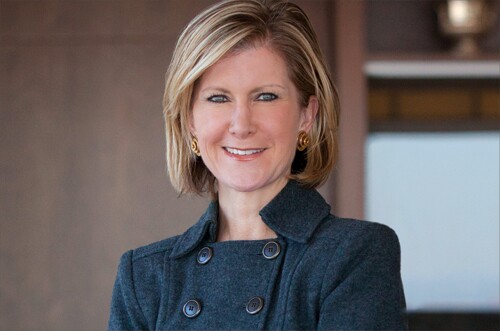
1. Mary Callahan Erdoes
CEO, JPMorgan Asset Management
Talk to Mary Callahan Erdoes for more than a few minutes, and one word is likely to keep coming up: intensity.
The chief executive of JPMorgan Chase's asset management unit not only says the word often, it's also a quality she exudes. It's enabled her to lead her division through five consecutive years of record revenue growth and to reign as American Banker's Most Powerful Woman in Finance for three years running. Erdoes attributes her professional dynamism in part to the example set by her late friend and former JPMorgan Vice Chairman Jimmy Lee, who died unexpectedly of a heart attack this year at age 62.
"It was game day every day for him, and that's certainly a life lesson that he instilled in me," Erdoes says while on a family road trip through the American West in August. "I believe in working hard and playing hard, whether that means logging 14 hours in the RV yesterday or pulling long hours trying to help clients. It's about giving it your all and really feeling like you've accomplished something."
Erdoes has plenty of accomplishments to point to. She's one of two women on JPMorgan's 12-person operating committee (the other is Chief Financial Officer
In the past few years, Erdoes introduced a program aimed at

2. Abigail Johnson
Abigail Johnson now in charge of the family business. Her father, Edward "Ned" Johnson 3rd, announced last year that she was succeeding him as chief executive of the mutual fund giant a promotion that was
The handoff has been a smooth one; Moody's Investors Service gave Boston-based Fidelity generally high marks for its leadership changes. While Moody's wasn't as high on the company's profitability and financial flexibility, the overall outlook was for near-term stability, with analysts seeing Johnson, 53, as unlikely to deviate from Fidelity's longtime strategic direction.
Fidelity is America's second-largest mutual fund company, behind Vanguard Group, with nearly $2 trillion in assets under management. And Johnson, with a fortune of about $17 billion, is estimated to be the world's seventh-richest woman. Forbes also ranked her No. 19 among the world's 100 most powerful women ahead of Beyonce (No. 21).
One thing that hasn't changed with Johnson's new responsibilities is her well-documented shunning of the limelight a trait she has in common with her father. She's seldom quoted in the media, even when events shine attention on her, as they did in April. A Securities and Exchange Commission filing showed that Johnson had used some of her personal fortune to fund the initial public offerings of several companies involved in oncology work. Johnson has declined to comment publicly about it, and Fidelity has said the investments were personal.
Johnson has hardly been silent on the role of women in her industry, though. "There are a lot of big legacy organizations with a lot of traditions that tend to be built around men, and that does make it harder for women, I think, compared to other industries," Johnson said in a 2013 video released by Fidelity.
But she stressed that women often are exceptionally well suited for positions like hers. "There are a lot of aspects of finance that I think can be very good for women," she said. "In particular the area that I started out in investment management I think is a terrific career for women."
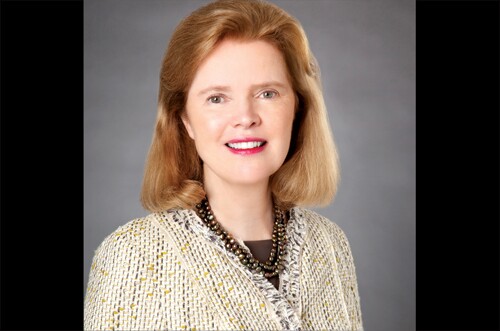
3. Barbara Byrne
The upcoming indie film "Equity" turns our expectations about gender and finance on their head. It's a movie about Wall Street, and virtually all of the key players are women.
The lead character is a female investment banker who's taking a technology company public. The film's director, writer and producers are all women. Much of the financing for the project came from women too. It's fitting that Barbara Byrne, an investment banker who herself has expertise in the tech sector, is a key investor.
But don't confuse Byrne, vice chairman of investment banking at Barclays, with the movie's protagonist. "The character is a different kind of woman than I am," Byrne says, noting that she raised a family during her banking career, while the film's character is single with no kids.
Byrne has spent nearly four decades in the banking industry, mostly at Lehman Brothers, where she rose to vice chairman before the firm's collapse in 2008. In recent years she has found atypical ways to support the careers of women. Before her foray into the film business, she launched the
"Equity," a drama that was filmed over the summer in New York and Philadelphia, will star Anna Gunn, who played the wife of drug kingpin Walter White on the hit TV drama "Breaking Bad." It is expected to be released next year.
A short blurb from the film's production company refers to Gunn's character navigating scandals and sexism as the company's IPO approaches. It also promises that the movie will spark conversations about the issue of unequal pay for women, and about the current image of Wall Street.
In the wake of movies that portrayed a male-dominated, often misogynistic culture see "The Wolf of Wall Street," for example "Equity" could mark a turning point in Hollywood's portrayal of the financial sector.
Another film that's currently in development, "Opening Belle," is slated to star Reese Witherspoon as an investment banker who's juggling family life and work responsibilities in the run-up to the financial crisis. Byrne has no involvement in that movie, which will
Byrne says that she was drawn to "Equity" because it is by women and about women. She invested an undisclosed amount in the film earlier this year.
"I've always believed in backing women," she says. "I had a lot of faith in these young women who were actresses and directors."
At the same time, Byrne was aware that the film's producers might have a hard time getting their movie made. She notes that Hollywood, much like the banking industry, doesn't have a lot of women in senior leadership positions.
Byrne's interest in the project only grew stronger when a skeptic warned her that the filmmakers would not be able to raise the funds they needed.
"I just started laughing. 'Oh, really? Sure they will,'" she recalls.
"I thought, 'Well, let's tell the story. Let's back the story that couldn't be told.'"
Byrne's work on the film went beyond her financial backing. She also provided feedback on how to make the movie resemble the day-to-day reality of Wall Street life as closely as possible.
And she spent time with Gunn, offering thoughts about the lead character and how she might behave in certain situations.
"She's a fictional character. But what about her rings true and doesn't ring true?" Byrne says.

4. Diane Offereins
EVP, Payment Services, Discover Financial Services
SUch is the pace of the suddenly technology-soaked payments world that a wide-ranging conversation with one of the industry's most recognizable executives quickly morphs into breaking news.
"Today we announced we are teaming with Samsung Pay," says Diane Offereins, Discover Financial Services' executive vice president of payment services, during a phone interview in August. "There is a proliferation of mobile and the way it's changing things, especially in our business."
Offereins has been in her job for about a decade, and has worked for nearly three dozen years in the payments industry, dating to a time when these companies moved slowly on adopting innovations. That's obviously changed. Corporate titans like Apple, Google and Samsung are aggressively pursuing mobile payments, and EMV chip cards and a constant flow of new forms of digital commerce guarantee this week will be different from last.
The industry looks to how Discover responds to these changes given its scale as the world's third-largest acceptance network. What the company supports and when is big news, and it's Offereins' job to draw on her experience and technology expertise to cultivate new relationships and spot the next big thing.
That makes Offereins, who Discover says is the "face of the company" in its engagement with business partners, a pillar of the payments market. Her influence reaches the 1,000 largest U.S. merchants, 3,700 financial institutions that issue debit cards on Discover's PULSE Network, plus partnerships with merchant acquirers and new companies. (She also ranked as

5. Marie Chandoha
President and CEO, Charles Schwab Investment Management
Charles Schwab Investment Management has enjoyed record growth under Marie Chandoha.
The nation's 14th-largest mutual fund manager now has $270 billion of assets under management, up 45% from when Chandoha joined Schwab in September 2010.
Chandoha attributes this growth to improved investor education and a strong commitment to lowering fees. Under her leadership, Schwab has reduced the operating expense ratios on its cap-weighted exchange-traded funds six times in the last three years and today those funds have the lowest operating-expense ratios in their Lipper categories.
Chandoha is committed to promoting diversity at Schwab, in part because she believes this builds stronger organizations and leads to better corporate results. Last year, she established a Women's Network at the company. The group is dedicated to helping female employees advance their careers, demonstrate their leadership capabilities and create outreach programs that help other women.
She also is a frequent speaker for the Women's Interactive Network at Schwab events, actively mentors women inside and outside of her company and is becoming more vocal about the importance of diversity in corporate boardrooms.
Another issue close to Chandoha's heart is conservation. Since 2011, she has been a board member for the Nature Conservancy's chapter in California, where she and her husband have placed half of their Sonoma County ranch into a Forever Wild Conservation Easement.
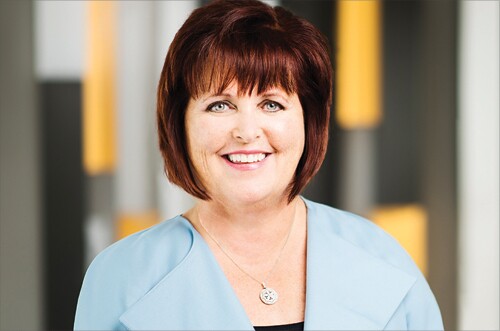
6. Margaret Keane
President and CEO, Synchrony Financial
Margaret Keane will never forget the feeling of ringing the opening bell on the New York Stock Exchange and seeing her newly public company's ticker symbol scroll across the screen.
It was July 2014 when the former GE Capital Retail conducted an initial public offering part of the process of separating from its parent company, General Electric.
As president and chief executive of the private-label credit card company, Keane had been responsible for everything that went into making the transition possible: opening data centers, adding roughly 700 employees, recruiting directors for the board and settling on the new name, Synchrony Financial.
Experiencing the culmination of it all, she was overcome with emotion.
"I imagine it's the same feeling of excitement someone who is building a home gets when there's a significant portion added on a master bedroom or a kitchen," Keane says. "It's a combination of satisfaction, pride and excitement for what the future holds."
To ensure a smooth break, Keane has been paying particularly close attention to customer retention, with positive results. She headed up Synchrony's effort to communicate with its retail partners which include brands such as American Eagle and Gap about the changes that would come with its separation from GE. Providing this timely information has led to Synchrony signing contracts that extend to at least 2019 with the brands that are responsible for 88% of its retail card receivables.
Synchrony delivered strong financial performance in 2014, with net earnings growing 7% from a year earlier, to $2.1 billion. The company also maintains its position as the country's largest provider of private-label credit cards based on purchase volume and receivables.
The past year has been a whirlwind but Keane says she has enjoyed it. "Without question, taking a company public that has excelled for 80 years as part of an iconic brand and transforming it into its own unique brand with a new name and identity has been the most fun I've had not just in the past year, but in my career in financial services," she says.

7. Mary Mack
President, Wells Fargo Advisors
More than 90% of Wells Fargo's banking customers have their retirement and brokerage accounts elsewhere, and Chief Executive John Stumpf is counting on Mary Mack to capture a chunk of that business.
In her first year on the job, Mack focused on partnering with other Wells units to win referrals, and the results were a 4% increase in brokerage assets and a 12% gain in managed-account assets.
She also aimed to improve the customer experience by streamlining the account-opening process and consolidating customers' quarterly statements into easy-to-read, highly personalized reports. Those are likely big reasons why customer satisfaction ratings are up for her unit; it climbed from No. 10 in J.D. Power's Full Services Investor Satisfaction study in 2014 to No. 3 this year.
Mack achieved this success while dealing with a personal tragedy: the loss of a 23-year-old daughter, who died after a brief illness in July 2014. To honor their daughter, Mack and her husband, Barry, raised money to support the development of a dog park and a scholarship fund. The 12-acre Mary Warner Mack Memorial Dog Park in Fort Mill, S.C., opened in May, the same month that the first scholarship to Clemson University was awarded in their daughter's memory.
Mack has long been an advocate of recruiting more women into financial services and makes it a priority to take part in industry events supporting women as leaders in the industry. She gave the keynote address at the Barron's Top Women Advisors Summit in December, and she chairs Wells Fargo Advisors' Diversity & Inclusion Committee.
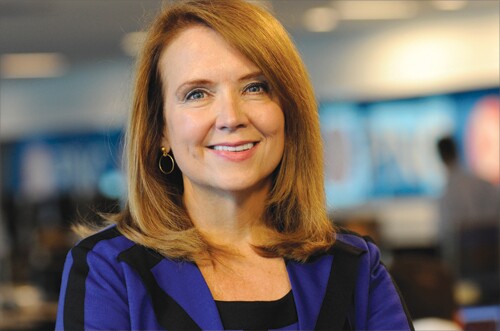
8. Charlotte McLaughlin
President and CEO, PNC Capital Markets
Innovation is often slow going at large financial institutions, but Charlotte McLaughlin can push a new product through the gauntlet of project managers and committees quickly.
Over the last year, she helped identify the need for a tool to help PNC clients comply with the Volcker Rule. "I put a small team on it with a vision," McLaughlin says. "After a few weeks and several iterations, PNC had a proprietary product that exceeded anything available to purchase, at a fraction of the price."
This kind of innovation, she says, "does not necessarily increase revenues or provide our clients with new bells and whistles, but it does increase compliance and efficiency in a time where each is increasingly important."
McLaughlin tries to allocate resources in the most efficient manner and takes a creative approach to doing more with less.
"I am constantly challenging my people with new and 'stretch' assignments in order to manage my business efficiently," she says. "It is a common misstep in large financial organizations to throw additional people at an issue. While that is often necessary, most managers do it by increasing overall headcount."
Instead, McLaughlin aims to "self-fund" new projects by repurposing individuals to a new project as an older one winds down. For example, the lead attorney working on implementation of the Dodd-Frank regulations for swaps was recently named chief risk officer for PNC Capital Markets, working under McLaughlin's chief operating officer. "This individual has a unique perspective on the business and is well qualified to identify and mitigate risks within the business," she says.

9. Candace Browning
Head of Global Research, Bank of America Merrill Lynch
What better way to explore "creative disruption" in the markets than with a creative approach? To give clients some fresh perspective on how innovation is upending business segments, Candace Browning and her team recently hosted an event with speakers from Google and Tesla.
Though the team puts out plenty of reports 70,000 a year, in fact the chance to hear from people inside such forward-thinking companies clearly resonated, as the event was standing room only.
But Browning is doing more than just talking about change ahead. She is working to be part of it. Over the past year, she and her team were central to the development of an innovative service that allows institutional clients to more easily compare analysts' forecasts.
Called Visible Alpha, the service launched in May 2015 with investments from Bank of America Merrill Lynch, Citigroup, Jefferies, Morgan Stanley and UBS. It's designed to make analyst projections more useful in real time by extracting the underlying data and standardizing it across the participating firms. It is currently in the pilot phase and set to expand operations next year.
Now the insight Browning is gaining in her research work is about to be put to use for her own company's benefit. She was recently appointed as executive sponsor for financial technology investments in global banking and markets. As such, she oversees the management of vendor relationships and technology used across the business.
Outside of B of A, Browning is on the board and the finance committee for Vital Voices, a program that helps women around the world improve their leadership skills.
She's also the executive champion for B of A's

10. Rebecca Patterson
The influence Rebecca Patterson has at Bessemer Trust is sizable, but it also carries far beyond the office.
As one of the money-management firm's three most senior leaders and the highest-ranking woman in Bessemer's 108-year history Patterson is involved in developing new products and services, directing marketing initiatives and setting overall corporate strategy. She's the primary spokesperson for the firm, seen frequently on stage at major industry events and on CNBC to comment on the financial markets and the broader economy.
Most importantly, as Bessemer's chief investment officer, Patterson oversees $57 billion in client assets.
Among her key moves last year was increasing Bessemer's "overweight dollar" positioning in client portfolios, hedging euro and Japanese yen risk. At the same time, she tilted toward U.S. stocks and away from traditional bonds, all helping to drive performance.
Since she joined Bessemer in mid-July 2012, the model diversified portfolio (through April) gained 10.5% versus the respective benchmark's 9.1% on an annualized basis.
Giving Bessemer clients new investment options is important to Patterson, and she is doing that in several ways.
To capitalize on opportunities following the 2014 collapse in oil prices, her team formulated an idea for a new real asset fund with an innovative structure and organized it in less than four months.
She also led efforts to bolster Bessemer's hedge fund, private equity, and real assets offerings by developing new analytical tools to optimize client allocations, increase outreach, and improve pricing.
Some of Patterson's attention is on helping advance the careers of her colleagues. Last year, she created a formal mentoring program in her department based on feedback from an annual employee survey. After three months of planning, which included training mentors, the program officially kicked off in 2015. It includes about 20% of the investment team and has generated enough early success to become the model for other departments at Bessemer.
In 2014, Patterson became chair of the nomination committee at the University of Florida Investment Corp., which manages a $2.7 billion endowment that supports her alma mater's charitable foundation, research, and hospitals. She has been instrumental in enhancing its performance and hiring its current chief investment officer.
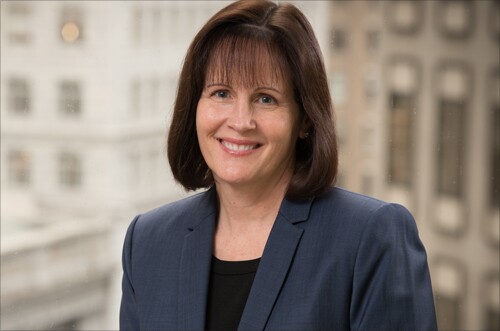
11. Carrie Dolan
When Carrie Dolan told her friends and colleagues that she was quitting her job as Charles Schwab's corporate treasurer to join a money-losing startup occupying a shared office space in the San Francisco suburbs, the news was received with a degree of skepticism and puzzlement.
"Most people thought I was nuts," Dolan says.
She wasn't entirely sure, when a headhunter first called to recruit her for the Lending Club job, precisely what peer-to-peer lending was. But she did her research, met with the chief executive, Renaud Laplanche, and was sold. "My gut feeling was that this business model would change financial services," she says. "So I decided to take a risk."
Five years and a $1 billion initial public offering later, Dolan's decision to take the job as chief financial officer looks like a pretty good call. The staff of 40 she joined has grown to nearly 1,000, revenue has increased from about $5 million a year to nearly $100 million last quarter, and the company has long since become profitable.
Best of all, Lending Club ditched its Redwood City office space — and a commute that was Dolan's only real misgiving about taking the job — for San Francisco proper.
Dolan doesn't linger on the achievement of the IPO, focusing instead on all that is left to be done. "The IPO was a great milestone for the company, but we're still in the first or second inning," she says. "We're not just about unsecured lending and credit card refinance, we want to take on all credits."
Figuring out how to expand into other loan types is a big part of Dolan's job, and Lending Club plans to announce its entry into a new type of consumer lending later this year. It began this past year to make small-business loans and bought a company that offers loans for education and medical procedures.
A key challenge with shifting to a startup like Lending Club is learning to improvise and make mistakes — a major change in mentality, Dolan says.
"In a small company you have to iterate, because you're testing and learning," she says. "In a bigger company when you make mistakes, it can cost you your career."
However, Dolan sees more resemblances than differences between her roles at Lending Club and at huge corporations earlier in her career. "Even though I was working for big companies, a lot of my experience was about starting and growing," she says. The difference is that now "there's no mothership."
Dolan's first mothership was Chevron, where she spent more than a decade after getting her undergraduate degree in finance at the University of California at Berkeley.
In the mid-'90s, Dolan was recruited by Patricia Yarrington to help the energy company start a bank, as a way to simplify the regulatory regime for Chevron's credit card company. They managed to secure a de novo license and launch Chevron Credit Bank. Dolan loved the work, and describes Yarrington, now Chevron's CEO, as her first mentor.
But two years later Dolan was shifted to a managerial role dealing with oil-and-gas finance. So she took a risk to stay in financial services, making what she called "a lateral step, or almost a step back," by joining Charles Schwab, in a job working to securitize margin loans.
Schwab also gave her a second taste of de novo banking, when she helped set up Charles Schwab Bank. In 2007, she was promoted to treasurer of Charles Schwab, the parent company, but her ambitions lay elsewhere. "I wanted to be a CFO," she says.
And so she is.

12. Suni Harford
Managing Director and Regional Head of Markets in North America, Citigroup
The highlight of the past year for Suni Harford was receiving the Outstanding Civilian Service Award from the United States Army.
"I was honored to place the wreath on the Tomb of the Unknown Soldier at Arlington as part of the changing of the guard ceremony," says Harford, the regional head of markets for Citigroup in North America.
It wasn't just the emotional weight of the ceremony, or the overwhelming silence broken only by the footsteps of the guards that struck her with awe. The heartfelt words of her son did too.
"The pride I felt when my 10-year-old son looked at me and said simply, 'I'm proud of you Mommy.' Truly one of the greatest moments of my life," she says.
Harford received the award for her work on Citi Salutes, which works closely with nonprofits and public agencies to help veterans start and grow small businesses. Harford founded the initiative in 2010 and is the senior business sponsor.
Harford mentors many women and men across Citi and, outside of work, serves on several boards, including at the Forté Foundation, a nonprofit that focuses on helping women get into business careers. "I strongly believe that board service can provide critical and directly relevant experience for anyone," she says.
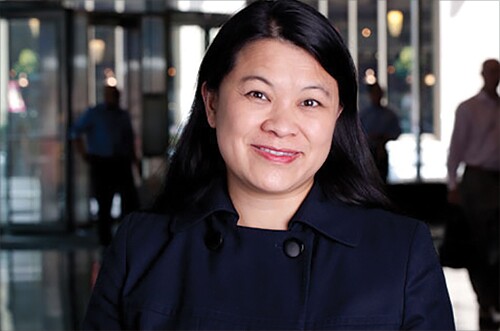
13. Joyce Chang
Global Head of Research, Corporate and Investment Bank, J.P. Morgan
When it comes to building diversity in the financial services industry, attracting more women is half the battle. That's a problem Joyce Chang is working to solve by holding more recruiting events that are focused on women, particularly for the research division, which she leads. Her goal is to have a 50% female staff in research globally.
Chang hosted a networking event in Washington, D.C., last December that attracted more than 100 female applicants from 14 universities in the area, many coming from a public policy background. She's involved in efforts to organize "boot camp" sessions for nonfinance majors joining the company and to provide media training for women to improve their public speaking skills. She's also helped to launch a mentoring program for women in the research division. Chang
Outside of the office, Chang has organized the annual Women in Fixed Income conference held by the Fixed Income Analyst Society and she serves on the board of directors at the nonprofit Girls Inc. She's also a member of the Council on Foreign Relations and the Council for Urban Professionals.
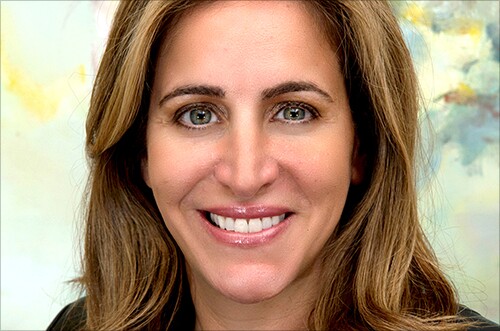
14. Katia Bouazza
Katia Bouazza has built HSBC's Latin American franchise into an investment banking powerhouse. Bouazza was the only woman on the team that established the business 12 years ago. She now serves as its head of capital financing and leads the Latin American business from her office in New York.
She also has global responsibilities, serving on HSBC's capital financing executive committee in London. Notably, she's the only woman on the committee.
Bouazza, who joined HSBC as an associate two decades ago, has made it a priority to encourage junior-level women to stay in finance and advance their careers. She frequently participates in employee panel discussions,
Bouazza attributes her success partly to her sense of adventure at work and in her personal life. She recently learned how to kitesurf, an experience she describes as liberating and scary. "Your whole body and mind is engaged," she says. "You need to be fully focused on the activity to avoid injury so it forces you to disconnect with daily responsibilities."
Kitesurfing, she says, helped prove to her two daughters that she is "still cool" and to herself that she can still learn a new sport.
But the fun factor aside, building courage was part of her motivation too. Working in the competitive field of investment banking takes a strong sense of character, she says. So she's constantly looking for new ways to step outside of her comfort zone.
"Who knows what you will see me doing next?" she says.
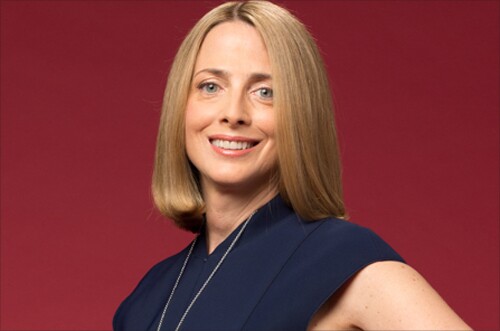
15. Julie Monaco
Global Head of Corporate and Investment Banking, Public Sector, Citigroup
Since Julie Monaco became Citigroup's global head of public-sector corporate and investment banking in 2013, she has reoriented the $1.8 billion business to focus on clients, rather than products.
The group advises governments on financial strategy and works to attract foreign direct investment and reduce corruption using technology.
As an example of that last activity, Monaco led a deal with the Philippine government to advance a cashless system as a means of combating theft by providing purchase cards. Common in developed countries but rarer in developing ones, purchase cards can be used for things like travel, entertainment, supplies and professional services, and the government can choose spending categories and control spending limits for each user. Citi provides the online tracking and management tools to help the government pursue anti-corruption schemes.
Under Monaco, the public-sector group won 700 deals in 2014 (and at least $450 million in business) in the United Kingdom, Hong Kong, Colombia, Spain, Mexico and other countries. It also landed deals with the United Nations and the World Bank.
Monaco has been at Citi since 2007, when she joined as head of the North American arm of global transaction services. She regularly attends the annual World Economic Forum in Davos with Citigroup Chief Executive Mike Corbat.
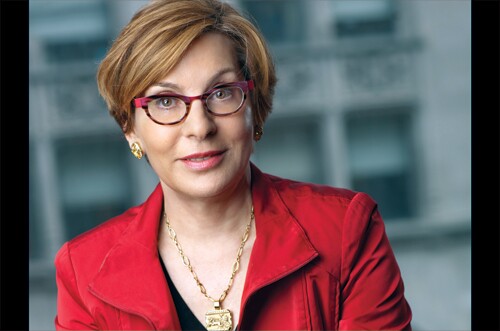
16. Diane Schumaker-Krieg
Managing Director, Global Head of Research, Economics & Strategy, Wells Fargo Securities
Wall Street is known for its high turnover, but Wells Fargo Securities, under Diane Schumaker-Krieg, has been an anomaly.
Since she took the helm of what was then Wachovia Securities in 2004, Schumaker-Krieg has tried to diminish burnout in her ranks by constantly keeping tabs on senior analysts to make sure they aren't overworking junior staffers.
Believing that people are a firm's greatest competitive advantage, she also created a culture of promoting from within. The result: more than 50% of the firm's senior analysts are homegrown.
The continuity has helped earn Wells' research and economics team a number of top rankings in areas ranging from industrial production forecasting to municipal bond research. Her equities research team earned second place in stock picking and earnings accuracy out of 167 firms in this year's Thomson Reuters StarMine Analyst Awards.
Her success has made her a sought-after speaker; she's been the keynote at several events, most recently a June event for technology, venture capital, and private equity executives.
As a high-ranking woman with a strong track record of nurturing female talent, she is also frequently asked to speak at events geared toward businesswomen.
Schumaker-Krieg doesn't sweat the spotlight at these events. She explains that during the financial crisis she and her husband, on a whim, bought a 1928 Knabe piano from a store that was going out of business despite the fact that neither knew how to play at the time. Learning the piano inspired her to take singing lessons, which she says has actually helped her public speaking.
"Presenting to a 1,000-person audience is a piece of cake relative to singing in public," she says.
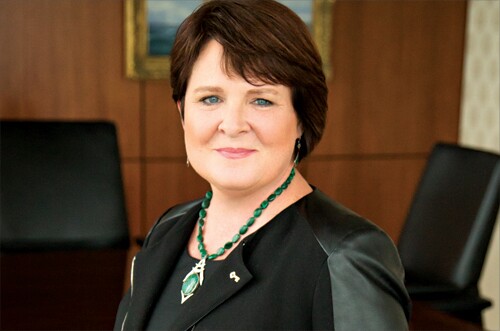
17. Amy Carlson
Group Head, Debt Capital Markets, KeyBanc Capital Markets
When it started in 2002, the loan syndications group at KeyBanc Capital Markets consisted of one person, Amy Carlson. Its function early on was mainly risk management.
In the dozen years since, Carlson has helped to build a business that has raised tens of billions of dollars for clients, including $80 billion in the last four years. Her responsibilities have expanded to include the high-grade and high-yield debt group, which last year raised over $96 billion in capital for clients. She is now the top female executive in the corporate and investment banking unit of parent company KeyCorp.
Carlson oversees 100 people working in six divisions that originate, underwrite, structure, price and manage various types of debt instruments on behalf of a spectrum of institutional, middle market and commercial real estate clients. The business line where it all started, loan syndications and sales, has logged five consecutive years of record growth under Carlson's leadership. Since 2013, the riskiest category of syndicated loan, leveraged finance, has come under increased regulatory scrutiny. In response, Carlson created a team to improve transparency and increase reporting for this higher-risk part of the portfolio.
Carlson says she believes that women in finance have a responsibility to provide opportunities for other women. This past year, she helped develop the inaugural Women in Corporate and Investment Banking conference to encourage young women to seek careers in the field. About 25 young women from universities across the nation participated in the daylong event.
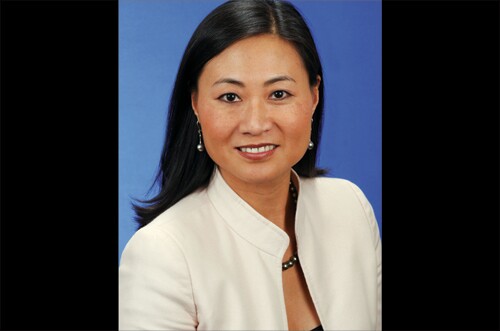
18. Elinor Hoover
Vice Chairman of Capital Markets Origination and Global Co-Head of the Financial Strategy and Solutions Group, Citigroup
When Elinor Hoover isn't at the office, you'll often find her on the tennis court. But she'll still be hard at work.
Competitive tennis is a focus for her family: her 12-year-old son is a United States Tennis Association-ranked player who is determined to improve his standings.
Hoover says she's eager to improve her own status beyond the family's "ball girl" and even compete in a few club tournaments.
It's a fitting personal challenge for a woman who has excelled in the fiercely competitive finance industry.
Hoover is a 26-year investment banking veteran who had been vice chairman of global capital markets at Morgan Stanley before joining Citigroup in 2011.
In her dual role at Citi, straddling both origination and advisory groups, she focuses on spotting emerging trends that affect corporations, financial institutions and government entities, and offering advice on how to navigate what may come. Her team puts out reports on key topics in corporate finance, and one earlier this year on growth strategies generated a lot of attention from boards around the world.
The team also has begun publishing biweekly analyses of issues ranging from oil prices to corporate tax reform, with an eye toward keeping clients ahead of changes affecting them. The goal is to provide global insight that differentiates Citi and positions it as an indispensable adviser to large corporations.
As part of that effort, Hoover also is bringing in outside perspectives. At a recent conference for institutional investors, she interviewed Robert Merton, a Nobel laureate and leader on corporate finance issues, about the implications of pensions in regard to the valuation of a company and its capital structure.
Outside of work, Hoover
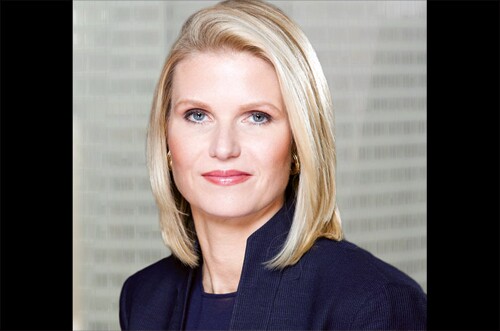
19. Elizabeth Myers
Head of Global Equity Capital Markets, J.P. Morgan
Liz Myers and her team continue to find ways to grow their business in a shaky global economy. Fees in the global equity capital markets unit at J.P. Morgan hit $1.6 billion in 2014, rising 5% from a year earlier. Her group completed nearly 500 deals, up from 469 in 2013.
She did this not only by tapping into the banking giant's existing capabilities; Myers found ways to build for the future by entering new businesses.
For instance, her unit created and staffed an equity private placement practice dedicated to pre-IPO fundraising, which has helped with a broader effort across the company to target more technology and biotech clients. The unit also built out its Canadian equity capital markets and distribution platform, which has enhanced global diversification.
Myers has been responsible for several internal projects designed to improve banker productivity, including a predictive analytics tool that will make the most of Big Data analysis. Myers also has been an advocate of global mobility, encouraging personnel to move among the company's regions to develop skills and gain experience.
Some of Myers' responsibilities at JPMorgan Chase go far beyond those covered by her business title. She is a member of the company's global investment banking management committee, a group that provides oversight and strategic direction for a business that contributes nearly $6 billion in annual revenue. She is also co-leading an effort dedicated to optimizing the interaction and relationships between the company's controls functions and its client-facing investment banking and product teams.
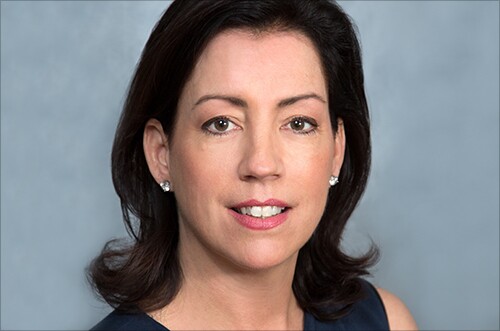
20. Tracey Brophy Warson
Head of Citi Private Bank North America, Citigroup
Tracey Brophy Warson's goal for 2015 is to improve on her performance from 2014, when she took the helm at Citi Private Bank North America. If first-quarter numbers are any indication, she will hit that goal. The unit reported double-digit growth in the quarter that ended March 31, driven by increased lending and clients' capital markets activity.
Overall client business volumes were $166 billion at the end of 2014, up from $152 billion in 2013, an increase Warson attributes to her team's success in converting more prospects to new clients. By midyear assets under management had swelled to $171 billion.
Warson is the first woman to head the private bank, and one of her responsibilities is ensuring that women at Citigroup are being considered for top jobs. Earlier this year, Warson was handpicked by Citigroup Chief Executive Mike Corbat to co-lead Citi Women, an internal organization established in 2006 to attract and retain female talent.
Warson has used this role to push for the equal representation of women on Citi's boards and has encouraged the company's participation in the 30% Club which was launched in the United Kingdom in 2010 with a goal of increasing the ratio of corporate board seats occupied by women to 30%. A U.S. offshoot of the group was established last year and its goal is to have 30% female representation on corporate boards by 2020.
Warson was previously Citi's head of private banking for the West Coast. In that role she founded the Citi Women's Network in the Bay Area in 2010 and helped launch the private bank's North America Diversity Operating Committee in 2011. Warson also has initiated discussions to share best practices of Citi Women with peer institutions and regulatory agencies like the

21. Paula Polito
Client Strategy Officer, Group Managing Director, UBS Wealth Management Americas
Paula Polito has changed a lot at UBS' wealth management business in the Americas, much of it related to steering the focus away from products and transactions to emphasize tailored advice. She joined UBS in 2009 as part of a team Chief Executive Bob McCann tasked with helping to revitalize Switzerland's largest bank. She overhauled UBS' approach to marketing and subsequently helped re-engineer several other lines of business.
Profits have not only increased in the various lines of business she oversees, but the unit overall is now better poised to serve so-called emerging affluent clients. Typically defined as people with $100,000 to $1 million of liquid assets or earning more than $75,000 a year, this is a market segment UBS had not previously served and is viewed as crucial to the future success of the wealth management industry in general.
Polito has been in her current role since March 2012, and innovations she has spurred along the way have made a lasting impact at UBS. For example, she helped orchestrate a shift in the Wealth Advice Center made up of 80 advisers managing $9.1 billion in assets from a reactive call-center model primarily focused on processing disbursements and account closures to a linchpin of the wealth management business that focuses on giving advice to deepen client relationships.
UBS now delivers advice to four times the number of plan participants that it did in 2012, and the deeper relationships that came as a result of the new advisory services helped generate a 45% increase in revenue from 2012 to 2014.
One of Polito's goals for the coming year both professionally and personally is to get more involved in veterans' causes. "Perhaps the catalyst to make this my mandate was a visit to Normandy last year with my husband on the 70th anniversary of D-Day," she says. "He and I both had fathers who served with the U.S. Navy in World War II, and they both fought on D-Day when they were just 17 years old."
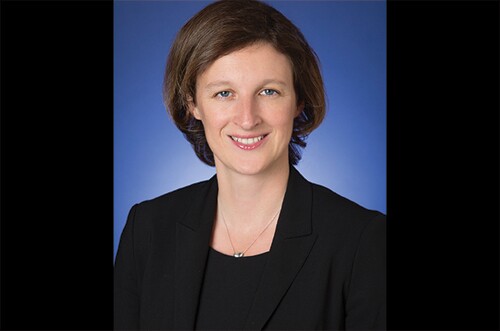
22. Fiona Bassett
Head of Passive Management in the Americas, Deutsche Asset and Wealth Management, Deutsche Bank
When she hasn't been flying a helicopter or piloting a powerboat, Fiona Bassett has been busy growing Deutsche's nascent U.S. exchange-traded fund business into one of the fastest-growing ETF platforms in North America.
After having worked for Deutsche Bank in London since 2004, Bassett last year was chosen to lead Deutsche Asset and Wealth Management's foray into the highly competitive U.S. market. At the start of 2014, the business had $1 billion in assets under management, ranking 25th in the American marketplace. It finished 2014 with $4.4 billion in assets, good for 15th place. In 2015, as of the end of May, assets under management had soared to $18.4 billion, putting the group in 11th place and in a strong position to crack the top 10 by the end of the year.
"When I asked Fiona to go to New York with a mission to establish Deutsche AWM as a serious ETF and passive mandates provider, I knew that I was sending her into the world's most competitive and crowded index fund market," says Michele Faissola, head of Deutsche Asset and Wealth Management. "But I also knew that if anyone could engineer the rapid advancements that I had envisaged, it would be her."
After identifying what the group needed to do to grow, Bassett began hiring aggressively. Her ETF sales team consisted of four people at the start of 2014; now there are 21. The product development team has expanded from six to 11. She now oversees a total of 40 people.
Bassett took to New York immediately. "How can you not have fun coming to New York and building a startup? The bank made it super easy, and everyone here is very friendly," she says.
Bassett keeps plenty busy outside of the office. She now has 45 hours of training as a helicopter pilot and also bought a boat, which she keeps at New York's Chelsea Piers, giving occasional harbor tours to friends visiting from overseas. She volunteers every Sunday morning at a soup kitchen next door to Deutsche's Park Avenue offices in Manhattan. And she chairs the Advisory Group of the Community Impact Initiative, which Deutsche Asset and Wealth Management recently created to engage employees in volunteer work in the community.
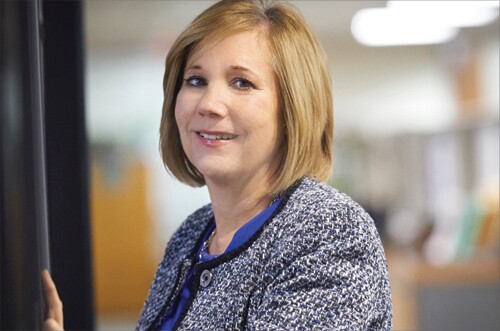
23. Kathie Andrade
Head of Individual Advisory Services, TIAA-CREF Financial Services
It's taken Kathie Andrade only a few years to transform TIAA-CREF's wealth management business.
When she joined as chief operating officer for Individual Advisory Services back in 2011, the unit had 66 offices and fewer than 300 advisers.
Today, there are more than 700 advisers with 125 offices around the country and a wide array of offerings brokerage services and managed accounts among them. The unit is on track to more than double total sales as compared with when she began.
TIAA-CREF's focus is on serving clients in the academic, research, medical and cultural fields, among others. Its organic growth model relies on building trust within these segments, and Andrade is doing well in that regard. Under her leadership, 38% of qualified sales leads have been converted significantly higher than the industry average, according to TIAA-CREF.
Andrade is enthusiastic about several technology initiatives that she expects to help improve the client experience. Among them is a new app for smartphones and iPads that lets clients view their accounts on the go, tap to schedule appointments, share files directly with their adviser and store them in a secure environment.
A key component of Andrade's talent acquisition strategy one that is designed to increase diversity within her organization is the Accelerated Advisory Development Program, a two- to four-year rotational program that prepares participants for careers in wealth management.
She came up with the idea as a way to get more women and underrepresented groups to enter the advisory field.
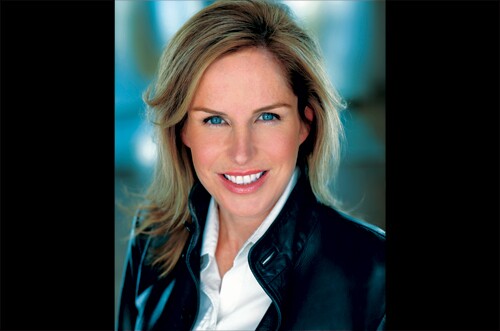
24. Dawn Fitzpatrick
Global Head and Chief Investment Officer, UBS O'Connor
When Dawn Fitzpatrick was growing up, she had a speech impediment so strong that her older sister, Tara, was often called upon to speak on her behalf. These days, Fitzpatrick can frequently be found sounding off on the markets to
Fitzpatrick, the global head and chief investment officer of the $5.6 billion hedge fund UBS O'Connor, says she remained quite shy even after speech therapy addressed her impairment as a child. But timidity wasn't an option once she became a trader at O'Connor & Associates in the early 1990s.
"You can't be shy in this kind of environment," Fitzpatrick says. "That's why I went into a very results-oriented, bottom-line, clear-cut type of job."
Her focus on the bottom line has helped her steer the flagship fund to a return of 84.11% since she took the helm at the UBS unit in September 2007. She oversees its 140 employees, and was recently chosen to serve as one of 15 leaders on the Federal Reserve's investor advisory committee on financial markets.
Fitzpatrick is one of only a handful of women to head a major hedge fund firm. She says the most surprising thing she's discovered about her job is how at ease she feels in its hyper-competitive milieu.
"I find it more stressful out of the office than in the office," Fitzpatrick says. "Running money and making calculated bets is a world where I'm very comfortable operating. It's outside the confines of this world that things are difficult to handicap."
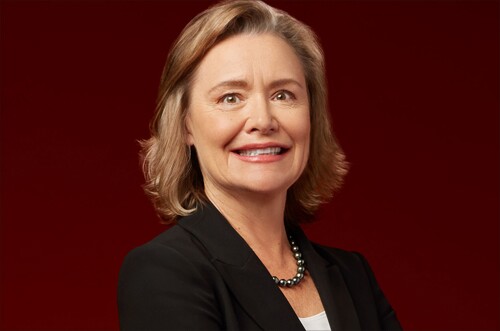
25. Louise Kelly
Louise Kelly opened EnerBank USA with $14 million of capital in 2002, and it passed a milestone of $1 billion in assets this year, just ahead of her retirement as president and chief executive in December.
Her biggest challenge now is transitioning to a new phase where she is solely a director. "I don't need to run the show and be the decision maker," says Kelly, perhaps wishfully.
A desire to be in charge had, until now, been one of her biggest motivators throughout her career. That will change, she hopes, when she drops the CEO title.
Her goal is to be effective in a supporting role. "I've served bad directors all through my career. They pop up every now and again," Kelly says. "I don't want to be one of those. That'll motivate me."
EnerBank, an industrial loan company based in Salt Lake City, is unique in that it makes home improvement loans exclusively. It sources the loans through a national network of contractors. Kelly devised the unusual business model and had to fight to put it into practice.
She faced the biggest challenges of her four-decade career at a previous incarnation of EnerBank, called First Utility Finance. It was at the time a division of First National Bank of Maryland. She arrived there at "a senior enough level" where she should have had support to execute her ideas, she says. Instead, she faced a lot of resistance.
One of her ideas involved making unsecured loans nationwide, which she says inspired opposition partly because it ran counter to the conventional wisdom that community banks shouldn't make loans to people outside the local market.
Eventually, the bank decided to shutter her small unit. But one of her clients, CMS Energy Corp., was looking to diversify its revenue stream, so in 1996 she negotiated the sale of First Utility to CMS.
"That, for me, was perfect, somebody that was willing to think out of the box to try something they haven't tried before," Kelly says.
The experience taught her the importance of having a sponsor who shared her vision. "You have to find somebody who has an interest in what you're doing," she says.
Running First Utility as a nonbank consumer finance company presented its own challenges, so eventually Kelly sought an industrial loan charter, which was granted to the rechristened EnerBank.
A proposed sale to Home Depot put a national spotlight on EnerBank for a time. The deal got nixed in 2008, after opposition to Wal-Mart's attempt to get into banking led to a moratorium on nonfinancial companies buying ILCs.
Home Depot said the controversy had nothing to do its decision to withdraw from the deal and cited the housing slump as a motivating factor. EnerBank thrived nonetheless.
Over the years, "we haven't changed very much at all," Kelly says. "The model is the same, the markets we serve are the same, but instead of $20 million a year in loans, we do $1 billion."
At first, Kelly was opposed to keeping her board seat at EnerBank after this year, wanting to retire completely. After having difficulty getting the compensation committee to approve a restructured bonus plan that would shrink the gap between management and general employees, she agreed to stay on, with the condition that her initiative be approved.
Her team at EnerBank includes several women she describes as "brilliant" — which is particularly satisfying for her as a female leader who started out as a teller. "They're not even 40 years old and they've been in executive positions for quite a while. That happens with men a lot, but I think it very rarely happens with women."
Kelly says her admiration for all the members of her team — watching them move up and take on new responsibilities — has propelled her and will continue to do so as she steps aside. "I'm very motivated by watching them succeed and not need me anymore," she says.





